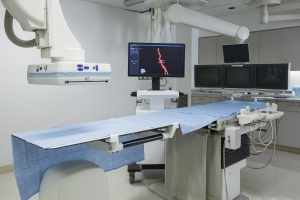by
John R. Fischer, Senior Reporter | January 29, 2019

Intra-Operative Positioning System
Centerline Biomedical has turned over its Intra-Operative Positioning System (IOPS) to the FDA in the hopes of gaining the agency’s stamp of approval to commence shipments throughout the U.S.
A non-radiation-based surgical navigation system, IOPS was developed at Cleveland Clinic’s Heart and Vascular Institute as alternative for overcoming the risks and visualization challenges of X-ray fluoroscopy.
“The visual challenges clinicians face when using fluoroscopy for minimally-invasive interventions in the cardiovascular system revolve around the poor visualization of soft tissue and the image as a two-dimensional projection,” Vikash Goel, chief technology officer for Centerline Biomedical, told HCB News. “Soft tissue, such as arteries and veins, does not attenuate X-rays enough to show up well on a fluoroscopic image. Blood vessels are also remarkably complex in geometry and looking at a flat projection of complex three-dimensional shapes can be very limiting when clinicians are trying to traverse the anatomy.”
The visualization of soft tissue can be improved with the use of radiopaque contrast medium, which temporarily makes the bloodstream visible on fluoroscopic images. The contrast dye, however, is toxic to the kidneys and must be applied in limited use. In addition, exposure to X-ray fluoroscopy raises the chances of patients developing cancer at some point in their life.
IOPS is equipped to extract never-before encoded information using AI and machine learning, and convert it with Centerline’s navigation technology, which is based on a proprietary vessel mapping system, into a concise and mathematically meaningful anatomical model.
The company plans to further build the product up to make use of the models with the creation of a database of procedures, comprising data about anatomical information and the use of endovascular devices. It also hopes for the data in aggregate to become the basis of a cloud-based platform that supports clinicians.
“By applying existing machine learning algorithms to these data, we hope to be able to match incoming cases to historical cases with anatomical similarities and facilitate the use of past experience to strengthen future interventions,” said Goel.
Upon gaining FDA clearance, the IOPS system will be available for use in endovascular aortic interventions, with the company planning to extend its indication through further developments.
Series B funding for product is currently taking place to prepare for its eventual market entry.
Back to HCB News
